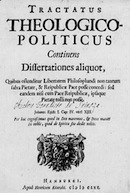
Source: Theologico-Political Treatise - Chapter I. of Prophecy
Spinoza's Chapter 1. - questioning the prophets (Page 6)
 Spinoza points out that ideas put forth by the prophets were not logically constructed but, with aid of the imagination, could be products from "beyond the boundary of the intellect."
Spinoza points out that ideas put forth by the prophets were not logically constructed but, with aid of the imagination, could be products from "beyond the boundary of the intellect."
He goes on – Thus we have a clue to the fact that the prophets perceived nearly everything in parables and allegories, and clothed spiritual truths in bodily forms, for such is the usual method of imagination. We need no longer wonder that Scripture and the prophets speak so strangely and obscurely of (Deus sive Natura)'s Spirit or Mind.
Is he just being polite to the prophets when they speak of (Deus sive Natura) as sitting somewhere, or as an old man, or as fire, or as a descending dove, or a great light?
He concludes the Chapter with – Inasmuch as imagination is fleeting and inconstant, we find that the power of prophecy did not remain with a prophet for long, nor manifest itself frequently, but was very rare; manifesting itself only in a few men, and in them not often.
Comment:
Spinoza commits the blasphemy of doubting the words of the prophets and indirectly the whole Bible.